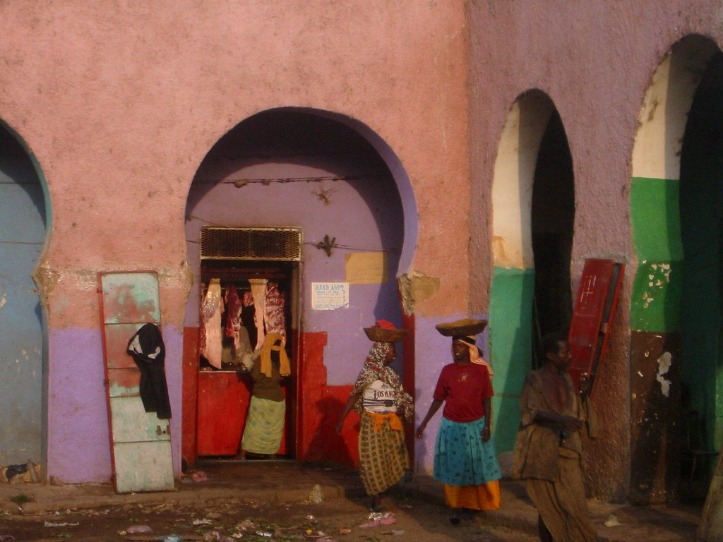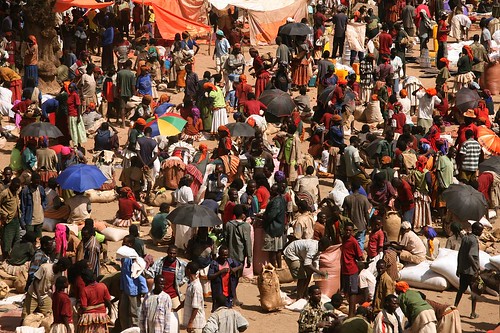Overview of the Black Market in Ethiopia
The black market in Ethiopia plays a significant role in the country’s economy, operating clandestinely alongside official markets. It involves the illegal trade of goods and services, often bypassing government regulations and taxes. This underground economy is driven by factors such as economic hardship, scarcity of essential products, and weak enforcement of laws. Understanding the scope and impact of Ethiopia’s black market is crucial for assessing the country’s broader economic and social landscape.
Definition and Characteristics
The black market in Ethiopia refers to the illegal trading of goods and services outside of government regulation and oversight. It operates clandestinely to avoid taxes, tariffs, and restrictions imposed by authorities. This underground economy often involves commodities such as foreign currency, fuel, medicine, and consumer goods that are either restricted or heavily taxed when sold through official channels.
The characteristics of the black market in Ethiopia include its secretive nature, high risk for participants, and significant influence on the country’s economy. It is driven by economic challenges such as currency shortages, inflation, and limited access to essential goods. Participants often use covert methods of transaction and operate in hidden markets or through informal networks. The black market can undermine government revenue, distort prices, and contribute to illegal activities, affecting overall economic stability and development in Ethiopia.
Historical Context and Development
The black market in Ethiopia has a complex history rooted in economic, political, and social factors that have evolved over decades. It has historically thrived due to regulatory gaps, scarcity of goods, inflation, and periods of political instability. During the Marxist-Leninist Derg regime, restrictions on imports and state controls created a fertile environment for illegal trade and smuggling networks to emerge. In the post-1991 era, economic liberalization and reforms gradually altered the landscape, but the black market persisted, adapting to changes in legislation and enforcement. The ongoing challenges of currency exchange restrictions, shortages of essential goods, and enforcement limitations continue to sustain underground trade activities. Over time, the black market has expanded beyond basic commodities to include pharmaceuticals, electronics, and foreign currency, reflecting its adaptability and the persistent demand within Ethiopian society. Understanding this historical context helps to grasp the current dynamics and the ongoing efforts required to control and regulate illicit trade in Ethiopia.
Major Commodities and Goods Traded
Major commodities and goods traded form the backbone of Ethiopia’s economy, encompassing a diverse range of products from agricultural produce to manufactured items. In the context of Ethiopia’s black market activities, understanding these key commodities is essential, as many of them are illicitly bought and sold outside official channels. The dynamics of black market trade significantly impact the livelihoods of many and reflect broader economic challenges faced by the country.
Contraband Cigarettes
Contraband cigarettes represent a significant segment of the black market trade in Ethiopia, contributing to substantial economic and social issues. These illicit goods often evade taxes and regulations, depriving the government of revenue and fueling organized crime networks. In Ethiopia, the smuggling and sale of contraband cigarettes are facilitated by porous borders and weak enforcement measures. The proliferation of illegal tobacco products not only impacts legitimate businesses but also poses health risks to consumers due to the unregulated quality of these goods. Major commodities such as khat, gold, and various agricultural products are also traded illegally, reflecting the extensive scope of Ethiopia’s black market economy. Addressing the illegal trade of contraband cigarettes requires strengthened border controls, enhanced law enforcement efforts, and international cooperation to dismantle smuggling networks and ensure compliance with legal standards.
Illegal Drugs and Narcotics
The black market in Ethiopia involves the illegal trade of various commodities and goods, including major commodities and narcotics. This underground economy poses significant challenges to the country’s legal and economic systems, often resulting in loss of revenue and increased criminal activity.
- Illegal Drugs and Narcotics: The black market frequently deals with the smuggling and distribution of illicit drugs such as khat, cocaine, cannabis, and synthetic substances. These drugs are often trafficked across borders and distributed within the country, fueling addiction and crime.
- Major Commodities and Goods Traded: Beyond drugs, the black market in Ethiopia includes stolen goods, counterfeit products, subsidized commodities diverted from official channels, and unregistered agricultural and livestock products. These trades undermine legitimate businesses and government revenue.
- Sources and Trafficking Routes: Many illegal drugs and commodities are transported through porous borders and remote routes, often involving corruption and complicity with criminal networks. The demand for these goods domestically sustains the illegal markets.
- Impact on Society and Economy: The black market hampers economic growth, reduces tax revenues, and promotes corruption. It also contributes to social issues such as violence, health problems, and reduced trust in legal institutions.
Stolen Vehicles and Auto Parts
The black market in Ethiopia involves the illicit trade of major commodities and goods, including stolen vehicles and auto parts. This underground economy is fueled by demand for affordable or bypassed products, often bypassing import regulations and taxes. Stolen vehicles are frequently repurposed, exported unlawfully, or sold as parts, contributing to the undermining of legal automotive industries. Auto parts trafficked through the black market include essential components like engines, transmissions, and electronic devices, which are often sourced from stolen or illegally imported vehicles. These activities pose significant challenges to law enforcement, economic stability, and safety standards within the country. The clandestine nature of this trade makes it difficult to quantify its true scale but underscores the ongoing issues of corruption, lack of regulation, and enforcement gaps in Ethiopia’s efforts to curb illegal trading practices.
Counterfeit Currency and Goods
The black market in Ethiopia involves the illegal trade of major commodities and goods, often bypassing government regulations and taxes. Commonly traded items include foreign currencies, precious metals, and high-value electronics, which are sometimes smuggled to evade tariffs and restrictions. Counterfeit currency and counterfeit goods also circulate within this shadow economy, posing significant challenges to the country’s financial stability and legitimate businesses. These illicit activities undermine legal markets, reduce government revenue, and can contribute to inflation and economic instability in Ethiopia. Efforts to combat this black market involve strict law enforcement, improved customs controls, and public awareness campaigns to discourage participation in illegal trade.
Rare and Endangered Species Products
The black market in Ethiopia involves the trading of major commodities and goods that are often unregulated, illicit, or restricted by law. This underground economy includes the smuggling and sale of valuable resources such as gold, coffee, and livestock, which are essential to the nation’s economy. Additionally, rare and endangered species products, including exotic animals, traditional medicine ingredients, and wildlife trafficking items, form a significant part of this illegal trade. These activities threaten biodiversity and undermine legal industries, making enforcement and awareness crucial in combating the black market’s impact on Ethiopia’s environment and economy.
Key Players and Stakeholders
In the context of Ethiopia’s black market, various key players and stakeholders play crucial roles in shaping its dynamics. These include government authorities, law enforcement agencies, and regulatory bodies that aim to control illegal activities. Additionally, traders, middlemen, and consumers involved in illicit transactions significantly influence the black market landscape. Understanding the interests and interactions of these stakeholders is essential to addressing the challenges posed by illegal activities in Ethiopia.
Criminal Networks and Syndicates
Key players and stakeholders in Ethiopia’s black market play a crucial role in the functioning and perpetuation of illegal activities within the country. These include individual brokers, small-scale traders, and organized criminal networks, each contributing to the supply and demand of illicit goods and services. Criminal networks and syndicates often operate across borders, facilitating smuggling operations, drug trafficking, counterfeit currency, and illegal trade in precious metals and natural resources. These groups are typically highly structured, with hierarchies that enable them to coordinate complex operations and evade law enforcement efforts. Their involvement not only fuels illegal economic activities but also undermines legitimate markets, public safety, and government authority in Ethiopia. Addressing these issues requires coordinated efforts among law enforcement agencies, policymakers, and international partners to dismantle these networks and disrupt their illicit operations.
Corrupt Officials and Enforcement Agents
The key players and stakeholders involved in Ethiopia’s black market activities include a range of individuals and groups who facilitate the illegal trade of goods and services. These often consist of corrupt officials and enforcement agents who leverage their positions for personal gain, undermining government efforts to regulate and control legal markets.
Corrupt officials play a vital role in enabling the black market by accepting bribes to overlook illegal activities, such as smuggling, counterfeit goods, or unauthorized trade. Enforcement agents, who are supposed to uphold laws and regulations, sometimes partake in or turn a blind eye to black market dealings in exchange for incentives, thus complicating efforts to curb illicit trade.
The involvement of these players creates a complex network that challenges law enforcement and anti-corruption initiatives. Addressing this issue requires comprehensive strategies to strengthen institutional integrity, improve transparency, and ensure accountability among officials and enforcement agencies involved in Ethiopia’s black market economy.
Local Traders and Consumers
In the context of the black market in Ethiopia, various key players and stakeholders influence the dynamics of illegal trade, including local traders and consumers. These participants operate within a complex network, impacting economic, social, and legal aspects of the country.
- Local Traders: They are often involved in the procurement, distribution, and sale of illicit goods, ranging from counterfeit products to smuggled items. These traders operate discreetly to evade law enforcement and maximize profits.
- Consumers: Individuals who purchase illegal goods for various reasons, such as lower prices or limited access to legitimate markets. Their demand sustains the black market economy despite potential legal risks.
- Law Enforcement Agencies: Authorities tasked with enforcing laws against illicit trade. Their effectiveness can influence the size and scope of the black market.
- Government Officials and Politicians: Some may be complicit or collaborate with black market operators, either through corruption or lack of enforcement, thereby enabling illegal activities.
- Criminal Networks: Organized groups that control and facilitate black market operations, often involved in smuggling, counterfeit production, and distribution channels.
Methods and Channels of Illegal Trade
The black market in Ethiopia operates through a variety of methods and channels that facilitate the illegal trade of goods and services. These underground networks often exploit gaps in regulation and enforcement, making it challenging to curb illicit activities. Understanding the different methods and channels is crucial for addressing the root causes and implementing effective measures to combat illegal trade across the country.
Smuggling Routes and Tactics
Methods and channels of illegal trade in Ethiopia encompass a wide range of tactics used by traffickers to evade law enforcement and regulatory oversight. Smugglers often exploit remote and unpatrolled borders, using rugged terrains and dense forests to conceal their activities. Vehicles, including trucks, boats, and even aircraft, are commonly employed to transport illicit goods across borders discreetly. In addition, underground tunnels and hidden compartments within legitimate cargo shipments are frequently used to hide contraband. Smuggling routes tend to follow traditional pathways that connect Ethiopia to neighboring countries such as Eritrea, Djibouti, Sudan, and Somalia, taking advantage of poorly monitored borders and corrupt checkpoints. Tactics include the use of false documentation, bribery of officials, and the employment of local guides who understand terrain and security gaps. Additionally, urban centers and marketplaces often serve as hubs for the sale and distribution of black market goods, ranging from counterfeit products to endangered species and narcotics. The clandestine nature of these activities makes enforcement challenging, requiring coordinated efforts and intelligence sharing among border agencies and law enforcement entities.
Use of Technology and Online Platforms
The black market in Ethiopia employs various methods and channels to facilitate illegal trade, often leveraging modern technology and online platforms to evade detection and reach a wider audience. These methods enable illicit traders to operate discreetly and efficiently, making enforcement challenging for authorities.
- Physical Markets and Informal Networks: Traditional bazaars and clandestine gathering spots remain central to black market activities, where goods are exchanged discreetly among trusted networks.
- Use of Mobile Communication: Traders utilize SMS, phone calls, and encrypted messaging apps to coordinate transactions and avoid digital traces.
- Online Platforms and Social Media: Facebook, WhatsApp, and other social media networks serve as marketplaces where listings for illegal goods such as counterfeit products, weapons, and endangered species are posted and shared.
- Dark Web Markets: Although less widespread, specialized dark web sites are occasionally used for illicit trade, offering anonymity through encrypted channels and cryptocurrencies.
- Cryptocurrency Transactions: Bitcoins and other digital currencies are increasingly employed to conduct cross-border trade of illegal items, minimizing the risk of financial tracking.
Overall, the combination of traditional methods with advanced technology creates a resilient and adaptable black market environment in Ethiopia, complicating efforts to curb illegal trade activities.
Street Markets and Hidden Shops
Methods and channels of illegal trade in Ethiopia often involve a complex network of street markets and hidden shops that operate outside formal regulatory systems. These illicit transactions typically include the sale of counterfeit goods, smuggled items, and prohibited commodities such as drugs, weapons, and endangered species. Street markets serve as the primary point of contact between vendors and buyers, allowing quick and discreet exchanges while avoiding detection by authorities.
Hidden shops, often located in discreet locations or back alleys, provide a covert environment for illegal trade. These establishments are usually unregistered and operate without licensing, making them difficult to monitor and shut down. Vendors in these hidden shops rely on word-of-mouth, periodic relocations, and anonymous transactions to evade law enforcement efforts. Additionally, the use of digital platforms and mobile communications has facilitated clandestine trade, enabling traders to reach a wider customer base while maintaining secrecy.
The black market in Ethiopia thus thrives on layered channels and covert methods, leveraging informal networks, unregulated markets, and technological tools to sustain illegal trade activities and evade authorities.
Impact on Society and Economy
The black market in Ethiopia significantly influences both society and the economy, often operating outside legal regulations and impacting daily life. While it can provide access to essential goods and services that are otherwise unavailable, it also fosters illegal activities that undermine formal economic systems. Understanding its impact is crucial for addressing broader social issues and implementing effective policies to promote sustainable development and economic stability in the country.
Economic Losses and Revenue Evasion
The black market in Ethiopia significantly impacts society and the economy by undermining legitimate businesses, reducing government revenue, and fostering illegal activities. It leads to a decline in tax revenues, which are crucial for public services and infrastructure development, thereby hindering national progress. Economic losses from such underground markets also discourage foreign investments due to instability and lack of regulatory oversight. Revenue evasion through black market operations allows individuals and organizations to avoid taxes and tariffs, resulting in substantial financial gaps for the government. Consequently, this fosters economic disparity, fuels corruption, and hampers sustainable development efforts within the country.
Public Health and Safety Concerns
The black market in Ethiopia significantly impacts society and the economy by undermining legitimate businesses, reducing government revenue, and fostering corruption. It often leads to job losses in formal sectors and discourages investments due to an unstable market environment. Public health and safety concerns are also exacerbated, as unregulated goods, such as counterfeit medicines and substandard products, are circulated, posing risks to consumers. Furthermore, illegal trading activities can facilitate the spread of illicit substances and endangered goods, threatening community well-being. Overall, the black market hampers sustainable development and compromises social stability in Ethiopia.
Impact on Legitimate Businesses
The presence of a black market in Ethiopia significantly affects both society and the economy by undermining legal trade and financial systems. It often fosters criminal activities, including smuggling and corruption, which can destabilize social order and erode trust in government institutions. Additionally, the black market discourages legitimate businesses by creating unfair competition, as illicit traders do not adhere to regulatory standards or pay taxes, leading to economic distortions. This environment hampers economic growth, reduces government revenue, and discourages foreign investment, ultimately impacting the overall development and stability of the country’s society and economy.
Social and Ethical Implications
The black market in Ethiopia significantly impacts society and the economy by fueling illicit activities that undermine legal businesses and government revenues. It creates an uneven playing field for lawful traders, leading to increased unemployment and economic instability. Socially, the black market fosters corruption, fosters crime, and erodes trust in institutions, which can destabilize communities. Ethically, it raises concerns about fairness, honesty, and the rule of law, as illegal transactions often involve exploitation and contribute to negative societal behaviors. Addressing these issues requires comprehensive strategies that promote legal compliance, strengthen institutions, and foster ethical standards within Ethiopian society.
Law Enforcement and Government Intervention
Law enforcement and government intervention play a crucial role in addressing the challenges posed by the black market in Ethiopia. These efforts are essential to combat illegal activities, ensure national security, and protect the economic stability of the country. Effective policies and enforcement strategies help to disrupt illegal trade networks and promote lawful economic participation.

Legal Frameworks and Policies
Law enforcement and government intervention play a crucial role in combating the black market in Ethiopia. These efforts involve implementing strict legal frameworks and policies aimed at curbing illicit activities such as smuggling, illegal trading, and unauthorized sales. The government has established agencies dedicated to monitoring and dismantling black market networks, using a combination of surveillance, intelligence gathering, and enforcement actions. Legal frameworks are continuously updated to close loopholes and ensure severe penalties for those involved in illegal activities, thereby deterring potential offenders. Additionally, policies promoting transparency, fair trade practices, and economic reforms are essential components to reduce the dependency on illicit markets and foster a sustainable formal economy in Ethiopia. These measures collectively aim to strengthen the rule of law and protect consumers, legitimate businesses, and the country’s economic stability.
Challenges Faced by Authorities
Law enforcement and government intervention in Ethiopia’s black market are confronted with numerous challenges that complicate efforts to combat illicit activities. Authorities often struggle with limited resources, which hinder widespread surveillance and enforcement operations. Additionally, the clandestine nature of black market transactions makes it difficult to identify and dismantle illegal networks effectively. Corruption among some officials further undermines enforcement efforts, allowing underground markets to thrive unchecked. Ensuring public cooperation and awareness is another hurdle, as many citizens depend on black market goods due to shortages or high prices in legitimate sectors. Despite these obstacles, the Ethiopian government continues to develop strategies aimed at strengthening legal frameworks, increasing transparency, and enhancing cooperation with international agencies to root out illegal activities within the black market. Ultimately, overcoming these challenges requires a comprehensive approach that combines law enforcement, economic reforms, and community engagement.
Notable Crackdowns and Successes
Law enforcement and government intervention have played a crucial role in combating the black market in Ethiopia. Authorities have implemented stringent measures to disrupt illegal trading activities, focusing on counterfeit goods, smuggling, and unauthorized trade networks. Notable crackdowns include targeted raids on clandestine markets, seizure of illicit merchandise, and the dismantling of criminal networks involved in black market operations. These efforts have yielded successes such as the reduction of illegal imports, increased awareness among consumers about counterfeit products, and improved enforcement of trade regulations. Despite these achievements, ongoing challenges demand persistent vigilance and adaptive strategies to effectively combat the black market and promote legitimate economic activities in Ethiopia.
Corruption and Institutional Weaknesses
The black market in Ethiopia is significantly fueled by weaknesses within law enforcement and government institutions, which often struggle to effectively regulate and control illegal activities. Corruption among officials has facilitated the growth of illicit trade, undermining efforts to combat smuggling, counterfeit goods, and illegal commodities. Institutional weaknesses, such as inadequate resources, lack of transparency, and compromised enforcement, hinder the state’s ability to uphold the rule of law. These issues create an environment where black market operations can flourish, perpetuating economic distortions and challenging national efforts to promote lawful commerce and economic stability.
Prevention and Combating Strategies
Prevention and combating strategies play a vital role in addressing the challenges posed by the black market in Ethiopia. As illicit activities continue to thrive in underground economies, implementing effective measures is essential to protect legitimate markets, ensure economic stability, and uphold law and order. This article explores various approaches to curbing the black market in Ethiopia and highlights the importance of proactive enforcement, community engagement, and policy reforms.
Community Awareness and Engagement
Prevention and combating strategies against the black market in Ethiopia require a comprehensive approach that involves strengthening law enforcement, improving border control, and enhancing regulatory frameworks. Implementing strict penalties for illegal activities and increasing surveillance can deter illegal traders from operating in the black market. Additionally, fostering collaboration between government agencies, local communities, and international partners is essential to identify and dismantle black market networks effectively.
Community awareness and engagement play a vital role in combating the black market in Ethiopia. Educating the public about the negative impacts of illegal trade on the economy, health, and safety encourages responsible purchasing decisions. Engaging community leaders and local organizations can help disseminate information and encourage reporting of illicit activities. Building trust and awareness within communities ensures a collective effort in identifying and preventing black market operations, leading to a more transparent and regulated marketplace.
Technological Solutions and Monitoring
Prevention and combating strategies, technological solutions, and monitoring are essential components in addressing the black market in Ethiopia. Effective prevention involves strengthening legal frameworks, increasing public awareness, and fostering community engagement to reduce the demand for illicit goods. Combating strategies include enforcing stricter penalties, enhancing border controls, and collaborating with international agencies to disrupt supply chains. Technological solutions such as surveillance systems, biometric identification, and digital tracking of goods can significantly improve detection and traceability of illegal transactions. Monitoring efforts rely on real-time data collection, intelligence analysis, and the use of big data analytics to identify patterns and target illicit activities accurately. Together, these approaches form a comprehensive effort to reduce the size and impact of Ethiopia’s black market, promoting economic stability and legal compliance.
International Cooperation and Partnerships
Prevention and combating strategies, along with international cooperation and partnerships, are crucial in tackling the black market in Ethiopia. These illegal activities undermine the economy, erode government revenues, and promote corruption. Effective measures require a comprehensive approach that involves multiple stakeholders at both national and international levels.
National strategies include strengthening law enforcement agencies, implementing strict customs controls, and enhancing surveillance and monitoring systems. Public awareness campaigns also play a vital role in discouraging participation in black market activities. Additionally, fostering legal trade and simplifying regulatory procedures can reduce the incentives for illicit trade.
International cooperation is essential given the transboundary nature of black market operations. Ethiopia collaborates with neighboring countries and international organizations to share intelligence, conduct joint operations, and develop cross-border legal frameworks. Partnerships with organizations such as INTERPOL and the World Customs Organization help enhance border security and trafficking investigations.
- Strengthening legal frameworks and enforcement mechanisms to penalize illicit traders effectively.
- Enhancing international information sharing and joint operations to dismantle black market networks.
- Providing technical and financial support to improve customs and border management capacities.
- Promoting regional agreements aimed at harmonizing trade regulations and reducing illegal cross-border activities.
- Encouraging public-private partnerships to monitor and control unauthorized trade channels.
Policy Reforms and Strengthening Legislation
Prevention and combating strategies, policy reforms, and strengthening legislation are essential components in addressing the black market in Ethiopia. Effective measures require a comprehensive approach that targets the root causes and operational channels of illicit activities.
- Implementation of strict enforcement mechanisms to monitor and penalize illegal trade activities.
- Development of specialized agencies tasked with intelligence gathering and suppression of black market operations.
- Reforming existing policies to close legal loopholes that facilitate illegal trade.
- Introducing updated legislation that clearly defines the scope of black market activities and associated penalties.
- Enhancing inter-agency collaboration to improve information sharing and joint operations.
- Promoting awareness campaigns to educate the public on the negative impacts of black market activities.
- Providing official avenues and incentives for legal trade to reduce reliance on illicit channels.
- Strengthening border controls and customs regulations to prevent smuggling and illegal imports.
- Regular review and update of policies to adapt to changing tactics used by black market operators.
- Encouraging transparency and accountability within government institutions to reduce corruption and abuse of power related to illegal markets.





0 Comments